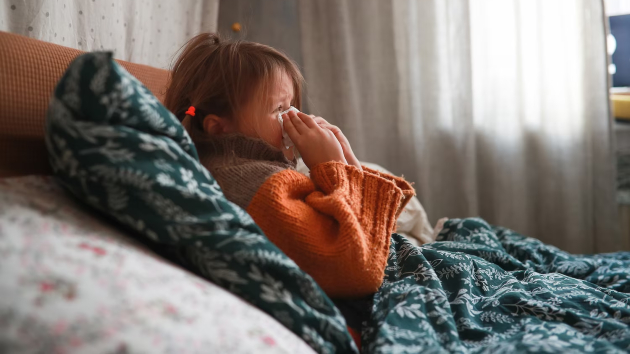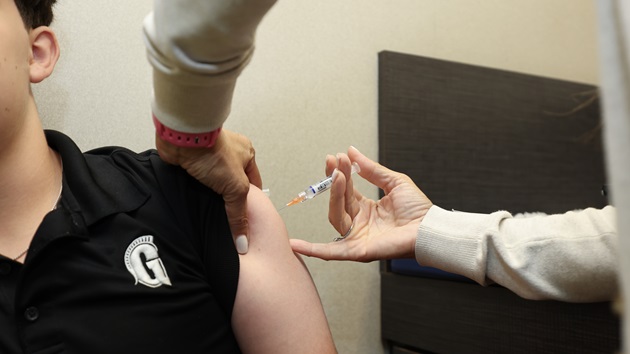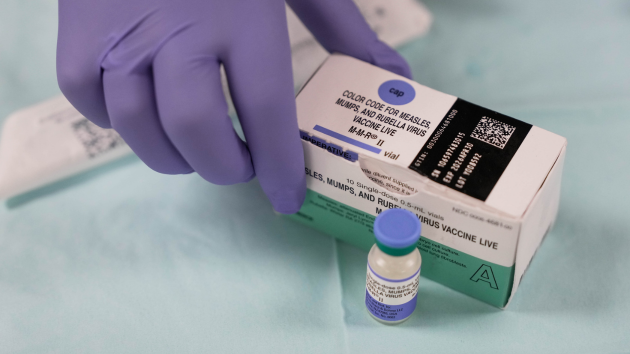No significant risk of birth defects after pregnant women got COVID vaccine in 1st trimester: Study
Written by ABC Audio ALL RIGHTS RESERVED on July 18, 2024
(NEW YORK) — Babies born to women who received a COVID-19 vaccine in their first trimester did not have a significant increased risk of birth defects, a new study found.
For the study, published Wednesday evening in the journal The BMJ, researchers used national public health registries in Denmark, Norway and Sweden to compare pregnant women who received either the Pfizer or Moderna vaccine in the first trimester and pregnant women who were infected with COVID-19 in the first trimester to women who were not vaccinated or infected.
The team followed more than 343,000 babies born to women with an estimated start of pregnancy between March 1, 2020, and February 14, 2022, with each infant followed for a minimum of nine months.
A total of 10,229, or 3%, of infants had mothers who were infected with COVID-19 during the first trimester. A subgroup of about 152,000 infants, or 19%, had mothers who received a COVID-19 vaccine in the first trimester.
Of the more than 343,000 babies, about 17,700 were diagnosed with a major congenital anomaly within a nine-month follow-up period, but there was no increased risk of any major birth defect for either the infected mothers’ group or the vaccinated mothers’ group, including heart, brain, eye, face, breathing, limb, kidney, genital and gastrointestinal defects.
All mothers were evaluated by considering factors such as age, smoking during pregnancy, body mass index, socioeconomic status, COVID-19 infection despite vaccination, infant prematurity and other chronic conditions.
The authors also found no increased risk of major birth defects related to fetal deaths that could be attributed to first-trimester COVID-19 infection or vaccination.
Some limitations included excluding mothers from the infected group if they had a positive antigen test followed by a negative PCR test within four days. Additionally, there was no information available on how many doses of vaccines the vaccinated mothers received.
However, the researchers say the findings are a further indication that pregnant people should be vaccinated.
“Vaccination of pregnant women protects the women and the infants from adverse outcomes,” the authors wrote in the study. “Furthermore, we did not find any indication that vaccination against COVID-19 during the first trimester increased the risk of anomalies, providing additional evidence about the safety of vaccination in pregnant women. Overall, our findings support the current recommendations to vaccinate pregnant women against COVID-19.”
The study is the latest in a growing body of evidence showing mRNA COVID-19 vaccines — which Pfizer and Moderna fall under — are safe to receive before and during pregnancy and do not increase the risks for complications including miscarriage, premature birth, stillbirth or birth defects.
In fact, some research has suggested COVID-19 vaccination can reduce the risk of premature birth and stillbirth, as well as help protect babies younger than 6 months old from being hospitalized due to COVID-19.
The Centers for Disease Control and Prevention (CDC) currently recommends that people who are pregnant, trying to get pregnant now, or who might become pregnant in the future — as well as who are breastfeeding a baby — receive an updated COVID-19 vaccine.
People who are pregnant are more likely to become seriously ill and hospitalized if infected with COVID-19, and more likely to suffer pregnancy complications including preterm birth or stillbirth, the CDC said.
Jade March, MD, a board certified family medicine physician and current integrative medicine fellow at UCLA, is a member of the ABC News Medical Unit.
Copyright © 2024, ABC Audio. All rights reserved.







